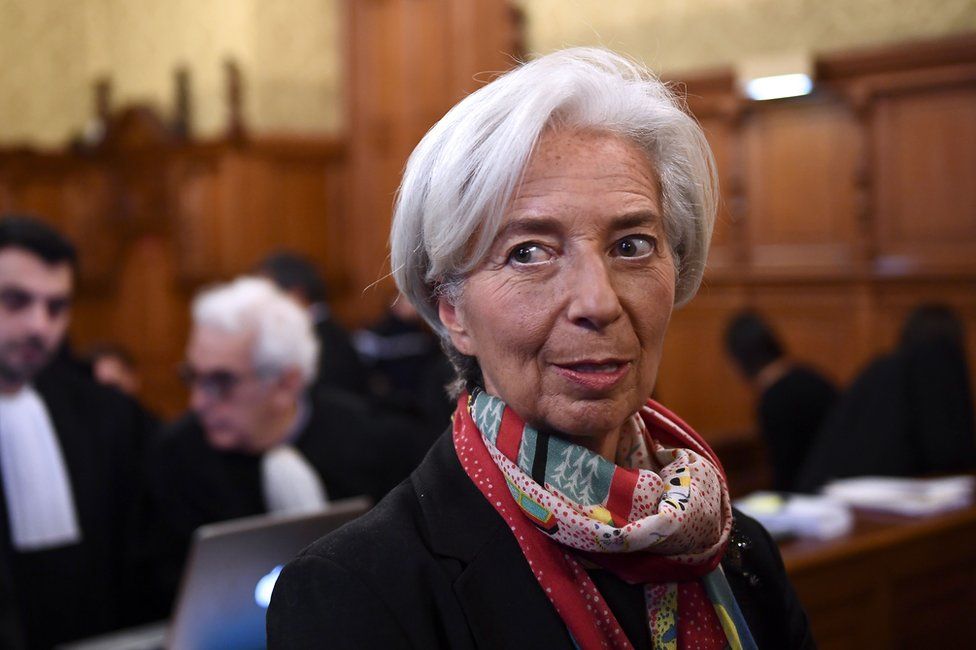Christine Lagarde: IMF chief convicted over payout
- Published

A French court has found International Monetary Fund chief Christine Lagarde guilty of negligence but did not hand down any punishment.
As French finance minister in 2008, she approved an award of €404m ($429m; £340m) to businessman Bernard Tapie for the disputed sale of a firm.
Ms Lagarde, who always denied wrongdoing, was not present in court, having left Paris for Washington DC.
The IMF board said it retained "full confidence" in her leadership.
She said she would not appeal against the ruling: "There's a point in time when one has to just stop, turn the page and move on and continue to work with those who have put their trust in me."
The French government also confirmed its confidence in Ms Lagarde, who was reappointed to a five-year term at the IMF in February.
On Friday, she told the trial she had always acted in good faith and the suspicion she had lived under for the past five years had been an "ordeal".
Cases at the Court of Justice of the Republic (CJR) may not be retried but can be appealed against on grounds of procedural errors.
Ms Lagarde's lawyer said his team would consider appealing, Reuters reported.
'Complicated and strange'
Ms Lagarde, 60, was tried on charges of "negligence by a person in position of public authority".
Accused of allowing the misuse of public funds, rather than actual corruption, she could potentially have been sentenced to a year in prison and a fine of €15,000, but escaped a sentence and emerges from the trial without a criminal record.
Explaining the verdict, which took many by surprise, Judge Martine Ract Madoux said: "The context of the global financial crisis in which Madame Lagarde found herself in should be taken into account."
She also cited Ms Lagarde's good reputation and international standing as reasons.
The CJR is composed mostly of politicians rather than judges, and handles allegations of crimes committed by cabinet ministers in office.
CJR trials are rare but in a similar judgment in 1999, it found another French politician, Edmond Herve, guilty of negligence over a contaminated blood case but did not punish him.
The earlier decision rested on a legal article (in French) which allows courts to deliver a guilty verdict but withhold actual punishment.
A lawyer for Ms Lagarde, Christopher Baker, told the Associated Press: "The result of this last five years is nothing, which leaves us in kind of a complicated and strange situation."
Public outcry
Ms Lagarde's case originates in the early 1990s, when Mr Tapie was a majority shareholder in sports goods company Adidas.
After launching a political career and becoming a cabinet minister in Francois Mitterrand's Socialist government in 1992, Mr Tapie had to sell the company.
In 1993, he sued Credit Lyonnais, a state-owned bank that handled the sale, alleging that the bank had defrauded him by deliberately undervaluing the firm.
By 2007, the long-running case was referred to binding arbitration by Ms Lagarde, who at that time was finance minister under conservative President Nicolas Sarkozy.
A three-member panel awarded the compensation a year later, causing a public outcry.
Last year, after eight more years of legal wrangling, a French court ruled that Mr Tapie had not been entitled to compensation and should repay the €404m.
In its verdict, the CJR said Ms Lagarde should have asked her aides and others for more information about the "shocking arbitration award" that included damages of €45m.
Lagarde-Tapie: A French saga
1993: Credit Lyonnais bank handles sale of Adidas to enable Mr Tapie to pursue ministerial career under then Socialist President Francois Mitterrand
1993-2007: Mr Tapie claims Credit Lyonnais undervalued Adidas and that he was cheated; lengthy court battle ensues
1994: Bernard Tapie's highly indebted group collapses and is wound up by Credit Lyonnais
2007: Mr Tapie supports conservative Nicolas Sarkozy in presidential election. Finance Minister Christine Lagarde intervenes in Tapie case to order binding arbitration
2008: Special judicial panel rules Mr Tapie should receive damages of €404m; Ms Lagarde decides not to challenge ruling
2011: Several months after Ms Lagarde is appointed head of the IMF, public prosecutor recommends investigation into her decision to order arbitration
2015: Appeals court orders Mr Tapie to pay back €404m with interest
2016: Ms Lagarde found guilty of negligence but spared prison sentence and criminal record
- Published19 December 2016
- Published19 December 2016
- Published22 July 2016
- Published20 March 2013